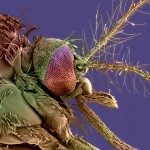Lien vers Pubmed [PMID] – 25993633
PLoS Negl Trop Dis 2015 May;9(5):e0003780
BACKGROUND: Chikungunya virus (CHIKV), mainly transmitted in urban areas by the mosquitoes Aedes aegypti and Aedes albopictus, constitutes a major public health problem. In late 2013, CHIKV emerged on Saint-Martin Island in the Caribbean and spread throughout the region reaching more than 40 countries. Thus far, Ae. aegypti mosquitoes have been implicated as the sole vector in the outbreaks, leading to the hypothesis that CHIKV spread could be limited only to regions where this mosquito species is dominant.
METHODOLOGY/PRINCIPAL FINDINGS: We determined the ability of local populations of Ae. aegypti and Ae. albopictus from the Americas and Europe to transmit the CHIKV strain of the Asian genotype isolated from Saint-Martin Island (CHIKV_SM) during the recent epidemic, and an East-Central-South African (ECSA) genotype CHIKV strain isolated from La Réunion Island (CHIKV_LR) as a well-characterized control virus. We also evaluated the effect of temperature on transmission of CHIKV_SM by European Ae. albopictus. We found that (i) Aedes aegypti from Saint-Martin Island transmit CHIKV_SM and CHIKV_LR with similar efficiency, (ii) Ae. aegypti from the Americas display similar transmission efficiency for CHIKV_SM, (iii) American and European populations of the alternative vector species Ae. albopictus were as competent as Ae. aegypti populations with respect to transmission of CHIKV_SM and (iv) exposure of European Ae. albopictus to low temperatures (20°C) significantly reduced the transmission potential for CHIKV_SM.
CONCLUSIONS/SIGNIFICANCE: CHIKV strains belonging to the ECSA genotype could also have initiated local transmission in the new world. Additionally, the ongoing CHIKV outbreak in the Americas could potentially spread throughout Ae. aegypti- and Ae. albopictus-infested regions of the Americas with possible imported cases of CHIKV to Ae. albopictus-infested regions in Europe. Colder temperatures may decrease the local transmission of CHIKV_SM by European Ae. albopictus, potentially explaining the lack of autochthonous transmission of CHIKV_SM in Europe despite the hundreds of imported CHIKV cases returning from the Caribbean.


